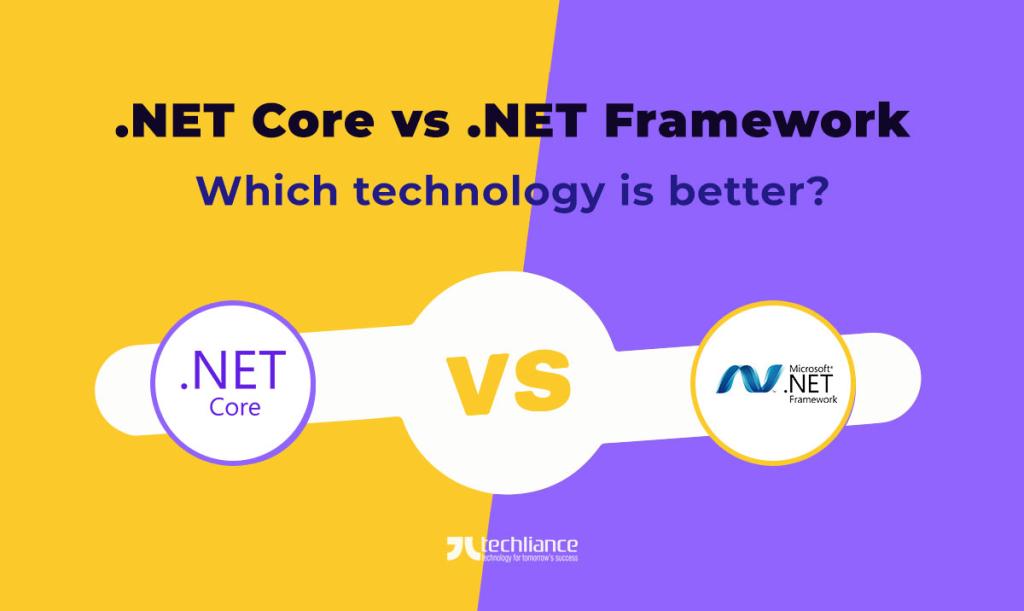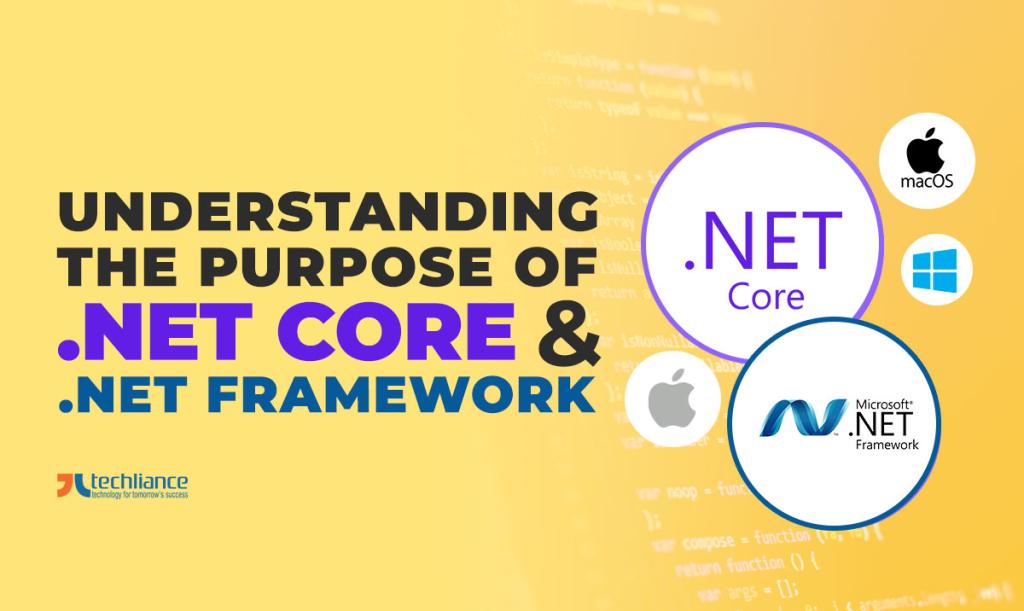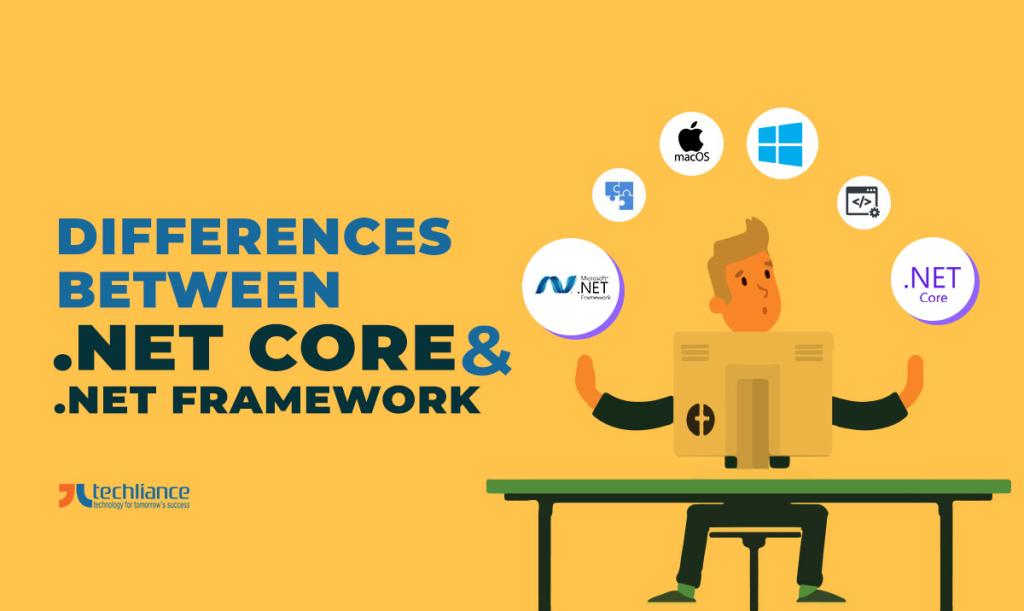Web application development is one of the top sources of revenue for businesses globally and in the United States. The .NET framework and .NET Core are among the reliable technologies making all this happen during 2023. So, a comparison like .NET Core vs .NET framework is necessary to make performant web-centric products accessible to users.
As web solutions evolve, companies must put immediate attention to choosing the right frameworks and platforms. After all, they must have a greater capacity to accommodate user requests on a large scale. Thus, they can continue designing software systems with support for code libraries and various scripting languages.
The next version of the .NET framework, .NET Core is a free and open-source programming platform. It is cross-platform so you can use it with Windows, Mac OS X, and even Linux. Also known as the .NET platform, it builds apps for mobile, online, cloud IoT, ML, microservices, games, and more.
.NET Core is modular, lightweight, and incredibly fast. Since it is succeeding .NET framework, it has become the talk of the town. Let’s discuss the .NET framework and .NET Core together in this article.

Table of contents
- Key Takeaways of .NET Core and .NET Framework
- Understanding the purpose of .NET Core and .NET framework
- The differences between .NET Core and .NET framework
- Winner of the .NET Core vs .NET Framework showdown
- Conclusion
- FAQs about .NET Core and .NET framework
Key Takeaways of .NET Core and .NET Framework
Here are the key giveaways that .NET Core and .NET framework offer through 2023.
- .NET framework is in the tech world for over two decades as a reliable framework for Windows-based product development.
- The newer entrant .NET Core is a great platform for the development of cross-platform applications for various use cases.
- Companies can evaluate the .NET framework and .NET Core on application models, installation, microservices support, REST services, performance, and scalability.
- A deliberation like .NET Core vs .NET framework reveals that both have their pros and cons.
- So, the need for deciding which one to pick depends on your business requirements.
Understanding the purpose of .NET Core and .NET framework
First-of-all, you need to understand what exactly the term “framework” means. A framework provides a reusable design platform for software systems along with support for code libraries and various scripting languages. The bottom line is that you can inherently use frameworks for making programming easy.
The .NET framework is suitable for developing and running Windows applications. It includes developer tools, programming languages, and even libraries to build desktop and web-based applications. For example, websites, enterprise applications, web services, games, etc.
You can use the .NET framework with C#, VB.NET, C/C++, ASP.NET, and other languages/technologies. Ever since its release by Microsoft in 2002, it has seen a warm welcome from the developer community. It has been one of the most sought-after software frameworks in the tech world for creating applications on Windows.
Whereas .NET Core is not just exclusive to Windows. It is an overall general-purpose development platform for building cloud-based software applications for Windows, Linux, and macOS. The .NET Core is the latest incarnation of the .NET framework with optimized modern app needs and developer workflows.

The differences between .NET Core and .NET framework
Here are some factors that can play a role in a discussion like .NET Core vs .NET framework in 2023.
- Platform or framework
- Open-source technology
- Cross-platform nature
- Application models
- Installation ease
- Microservices support
- Performance and scalability
- REST services support
- Application security
- Focus on devices
- Mobile development
- CLI tools
- Deployment model
- Packaging and shipping
Let’s take a look at the key differentiators between .NET Core and .NET framework.
Platform or framework
.NET framework is a complete software development framework. It has all the basic requirements for building applications such as UI, DB connectivity, services, APIs, etc. Whereas, .NET Core is a platform on which frameworks like ASP.NET Core, Universal Windows Platform, and others rely. They use the .NET platform to extend their functionalities.

Open-source technology
.NET Core is an open-source platform. While the .NET framework is not entirely open-source. However, it contains certain open-source components.
Cross-platform nature
The .NET framework is only compatible with the Windows operating system. Whereas .NET Core is built on the concept of cross-platform functionality. It enables the development of apps that can run on different operating systems such as Windows, Linux, and Mac OS.
Application models
The application model of the .NET framework includes WinForms, ASP.NET, and WPF. While the application model of .NET Core includes ASP.NET and Windows universal apps. Different application models of .NET Core and .NET framework mean they serve distinct use cases.
Installation ease
You can install the .NET framework through a single package and runtime environment for Windows. Whereas you have to install .NET Core independently. However, both the .NET framework and .NET Core come with ease of installation.
Microservices support
.NET framework does not allow the construction and deployment of microservices in multiple languages. While .NET Core actively supports the development of microservices. Even the .NET Core allows a mix of technologies that can be minimalized for each microservice.
Performance and scalability
.NET Core has high scalability and performance. It has become possible all thanks to its architecture. Whereas the .NET framework in comparison to .NET Core is less scalable with low performance.
REST services support
.NET framework has support for Windows Communication Foundation(WCF) and Restful services. While .NET Core has no support for WCF. So, for REST services you will have to create a REST API.
Application security
The .NET framework has a security feature known as code access security. Whereas this feature is not available in .NET Core. Keep in mind, .NET Core has some other application security features.
Focus on devices
.NET framework is limited to the Windows operating system. While .NET Core focuses to develop apps for a variety of domains/platforms. For instance, mobile, IoT, gaming, AI, ML, etc.
Mobile development
You can’t develop mobile apps through the .NET framework. This is a huge disadvantage of the .NET framework as you cannot extend it for this use case. However, .NET Core supports mobile app development through Xamarin and other similar open-source mobile application development platforms.
CLI tools
The .NET framework is very heavy for CLI. It is why some developers prefer working on CLI rather than on IDE. On the other hand, .NET Core has a very lightweight CLI with the option of switching to an IDE.
Deployment model
In the case of the .NET framework, the IDE is first deployed on the internet as an Information Service only. While, when a new version of .NET Core is installed, it is updated on the computer. It results in new directories and folders being created in the existing program without affecting it. This way, .NET Core provides a more solid and adaptable deployment model.
Packaging and shipping
The .NET framework packages and ships all its libraries together. Whereas, there is a collection of nuggets packages for .NET Core. So, ample mechanisms of packaging and shipping are available for the .NET Core and .NET framework.
Winner of the .NET Core vs .NET Framework showdown
There is no black-or-white answer. At times, it is rather astonishing to even get a definite answer without the background behind the question. We like building the context before answering the question.
Because it helps us make you fully understand the whole situation. After all, we are giving you an answer with the logic behind it. People who are following our blog for some time, are aware of this.
Likewise, this is the case when it comes to .NET Core vs .NET framework debate. It is important to understand your project requirements to go for either of the options. You should choose .NET Core if you have the following scenario.
- Your project requires cross-platform integration
- Moreover, there is a heavy reliance on CLI
- You need to have development of microservices
It is best to go for the .NET framework if this happens.
- Your applications are already running well on the .NET framework
- Your application requires workflow, web forms, and WCF
- You only want to develop an application that runs on Windows alone
Conclusion
We have already laid out the fundamental understanding of .NET Core and .NET Framework. Also, we have even gone into narrating their differences. It is important to comprehend that the .NET framework is entirely about building applications for the Windows operating system.
Whereas, .NET Core is a platform that allows extensive development on other various platforms apart from Windows. The point behind .NET Core is to give further acceleration to software development in different domains and technologies. However, this was not possible with the .NET framework.
Nevertheless, your business use case is the biggest dictator on which one to opt for. We have even given you pointers on when to use .NET Core or .NET framework. With those guidelines, making a safer choice is more likely.
Nonetheless, technical debates are usually difficult to deal with. Especially, if you have a running company with so many other aspects to look at. We at Techliance, have been a software solutions provider for over two decades.
Our business drivers are all about delivering quality solutions that are technologically mapping to areas of growth. Thus, we double down on providing higher capacity for our clients. Talk to us about your project expectations today.
We can guide you on the right technology frameworks, platforms, and languages to use for your tech stack. The discussion will then move on to the resources that will get down to developing your solution. We have a wide range of competent developers to provide you with cost-effective development services.
Contact us today to get set off on the right track of software development.
FAQs about .NET Core and .NET framework
Here are the answers to frequently asked questions on .NET Core and .NET framework.
Why is the .NET Core faster than the .NET framework?
The reason .NET Core is fast than the .NET framework is its architecture. Remember that .NET Core is written from scratch. This makes this cross-platform framework modular, lightweight, and faster.
When you should not use .NET Core?
Despite the many use cases of .NET Core, it is not suitable for .NET developers in such scenarios.
- The Applications require technologies like workflow, webforms, or WCF that are not present in .NET Core.
- Applications are built to run on Windows alone.
- You do not want to deal with continuous upgrades and changes.
Is the .NET Core replacing the .NET framework?
.NET Core and .NET framework have their distinct features and advantages. Microsoft is advising developers of the .NET framework to migrate their applications to .NET Core. However, it is providing support for the latest versions of the .NET framework to enable the smooth operation of applications.
What are the cases where the .NET framework is not the right choice?
While it is best for agile software delivery, you should not use or run .NET Framework in the following cases.
- The project demands cross-platform integration.
- Your company or client requires the development of a microservice.
- The project relies heavily on CLI (Command Line Interface) as .NET Core is suitable for CLI.
Author bio




